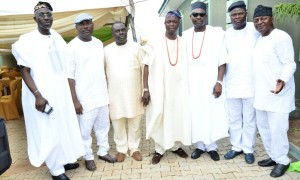By Kehinde Ayoola JP
The judiciary is saddled with the responsibility of upholding the rule of law by interpreting, construing and applying the laws of the land in the resolution of disputes and act as checks on the two other arms while also adjudicating on contentious issues.
(See Sections 232, 239, 251 and 272 of the Constitution of the Federal Republic of Nigeria, 1999 as amended).
Corruption has been tagged the bedrock of major challenges and economic woes facing the nation in recent time. Although, there is economic recession due to drop in oil prices, the level of impunity in different sectors of the economy as a result of corruption is alarming.
Many analysts argued that corruption is synonymous with misappropriation of public funds and act of bribery, forgery which compromises transparency and due process in government transactions.
Today, corruption is experienced across all religions, sexes, ages, political parties, professional, private and public entities. Its implications on the society are devastating which is why the administration of President Muhammadu Buhari takes it up as a national battle for meaningful development and desired change to be attained.
Kofi Annan, former UN Secretary-General, in his own perception, said:
“Corruption is an insidious plague that has a wide range of corrosive effects on society. It undermines democracy and the rule of law, leads to violation of human rights, distorts markets, erodes quality of life and allows organised crime, terrorism and other threats to human security to flourish”.
He went further: “This evil phenomenon is found in all countries big and small, rich and poor, but it is in the developing world that its effects are most destructive. Corruption hurts the poor disproportionately by diverting funds intended for development, undermining a government’s ability to provide basic services, feeding inequalities and injustice and discouraging foreign aids and investments. Corruption is a key element in economic underperformance and a major obstacle to poverty alleviation and development”
In his Inaugural Speech, President Buhari noted that “we face enormous challenges as a nation which includes insecurity, pervasive corruption, the hitherto unending and seemingly impossible fuel and power shortages are the immediate concerns”…
In order to achieve the objective of Nigeria democratic system, he said; “the Federal Executive under my watch will not seek to encroach on the duties and functions of the Legislative and Judicial arms of government. The law enforcing authorities will be charged to operate within the Constitution. We shall rebuild and reform the public service to become more effective and more serviceable. We shall charge them to apply themselves with integrity to stabilize the system”.
Obviously, the government is placing so much importance on the judiciary as an institution to operate within the confines of the constitution and uphold the rule of law in all matters. The judiciary has a great role to play in the efforts to save the nation from imminent collapse under the weight of unbridled corruption.
While delivering a speech at the 17th Annual Dinner of the Third Estate of Ilorin Emirate at Kwara Hotel, the Chief Judge of Kwara State, Justice S. D. Kawu said “corruption covers conduct or behaviour which constitute a change from the generally accepted norms, laws for personal gain and acts done with intent to give some advantage inconsistent with official duty and the rights of others, which have become criminalized.”
In his lecture titled “Fighting Corruption: The Role of the Judiciary” Justice Kawu pointed out that in Nigeria today corruption manifested in the following manners:
- Inflation of contracts in return for kickbacks;
- falsification of accounts and official records in the public service to cover up fraudulent acts;
- falsification of documents mostly educational qualifications to secure public offices;
- examination malpractices in educational institutions involving students, lecturers and administrative staff members;
- bribery, extortion, gratification and perversion of Justice in the police and other law enforcement agencies and the Judiciary;
- inflation of workforce for financial gain i.e., ghost workers syndrome;
- tax evasion,
- Over-invoicing of goods,
- smuggling and oil bunkering;
- Money laundering and other fraudulent practices in the banking and finance sectors amongst others.
Consequently, factors responsible for the scourge of corruption in all facets of Nigeria’s socio-economic and political systems are:
- Weak government institutions,
- Inadequate salaries and poor working conditions in the civil service with little or no incentives and rewards for efficient performance,
- Lack of openness and transparency in public service and
- Absence of genuine and concerted efforts to fight corruption by both the governors and the governed.
The 1999 Constitution of the Federal Republic of Nigeria as amended in Section 6 (6) provides the main function of the Judiciary as:
“Interpretation and application of the law in the resolution of conflicts between individuals and groups or between individual or groups and government and its agencies.”
In the course of carrying out her duty to adjudicate and interpret laws, the judiciary undertakes among others: the review of government actions; enforcement and protection of human rights and the maintenance of the rule of law.
The pioneer Chairman of ICPC, Hon Justice Mustapha Akanbi was quoted to have itemized the roles of judiciary in corruption fight when he said:
“the judiciary must be independent if it is to effectively play the role of an arbiter and ensure that the rule of law prevails; judges must be fair, just, and must not allow themselves to be influenced by extraneous considerations and that they should tower above corruption and always be true to their judicial oath.”
It is important to note that the courts also administer the penal laws of the land which involve the punishment of deviant behaviours, corrupt practices is also seen as a deviant behavior that have been criminalized by the various governments in Nigeria through promulgation of laws among which are:
- Penal and Criminal Code Laws of the various States of the Federation;
- Code of Conduct Bureau And Tribunal Act 1999;
- Advance Fee Fraud And other Related Offences Act, 2006;
- The Money Laundering Act, 2004;
- The Economic And Financial Crimes Commission (Establishment) Act, 2004;
- The Procurement Act, 2000 and
- The Independent Corrupt Practices and other Related Offences Commission (ICPC) Act.
The independence of the judiciary has a role to play in the discharge of their duties, for instance, the constitution provided that the appointment of the superior judges of the courts in the country is handled by the executives, then, the judges would be expected to follow the whims and caprices of their appointing authorities.
Reports had it that the government was unable to get credible judges to man the anti-corruption courts about to be established by the administration of President Buhari. Another crucial matter subjugating the efforts of the judiciary in the fight against corruption is the inadequacy and ineffectiveness of extant laws in meeting up with the sophistication, complexity and magnitude of such crimes.
Thus, the legislature needs to amend constitution existing provisions such as Section 29 (2) and (3) and Section 135 (2) ‘Evidence Acts’, to support the corruption fight by enacting new laws and reviewing extant ones to reflect the abhorrence of Nigerians for the cankerworm of corruption.
Basically, the judicial arm of government should begin to act constitutionally and avoid all forms of prejudicial activities in the interest of the rule of law. Without doubt, judges symbolize the judicial powers of the state; they stand out as the central figures in the judicial system and the administration of justice.
Thus, the ICPC, EFCC and other anti-corruption agencies in Nigeria should work within the confines of the constitution and support the judiciary in adjudicating and interpreting laws for corruption related cases.
In the submission on the role of judges on successful fight against corruption, Hon. Justice Pius Olayiwola Aderemi noted that Judges must undergo constant training not only in the general principles of law but also specifically in such areas dealing with EFCC, ICPC, money laundering, cyber-crime and other related offences.
There is also the important need to fight corruption within the Judiciary itself.
The Judiciary, as a human institution, is not immuned from corruption.
Judicial corruption includes:
- All forms of inappropriate influence that may damage the impartiality of justice, and may involve any actor within the justice system, including lawyers and administrative support staff. The question of corruption is not only a matter of relations between judicial personnel and ‘court users’(public and private parties in civil cases, prosecutors and accused in criminal cases); it is also about internal relations in the judiciary. The ‘gain’ needs not be material. It can also be sexual favours, or the offered ‘furtherance of political or professional ambitions’ (TI, 2007:xxi),and may also take the form of avoiding something undesired, in the form of threats. Biased decision-making is thus not only a matter of the personal integrity of judicial personnel, but concerns the structural protection of judicial independence and the insulation of judicial decision-makers from illegitimate political and hierarchical influence.
Citizen confidence in the judicial system requires that judges, lawyers, court clerks, and others associated with the judiciary maintain the highest ethical standards. This requires a variety of measures — from clearly stated rules on the conduct expected through ethics training to procedures for resolving complaints of unethical or improper behaviour. There are examples of how various developed and developing countries have addressed these issues. It includes codes of conduct for lawyers, judges, and others working in the justice system as well as material on ethics training and arrangements for enforcing ethical norms.
The Global Corruption Report 2007, published by Transparency International, looks at how, why and where corruption mars judicial processes, and to reflect on remedies for corruption-tainted systems. This publication focuses on judges and courts but situates them within the broader justice system – police, prosecutors, lawyers and agencies responsible for enforcing judicial decisions. It also looks at the social context of the judiciary and shows how societal expectations, the existence of non-state justice mechanisms and the strength of informal networks that circumvent the justice system, all have a bearing on judicial corruption. The report takes a close look at the two main judicial corruption problems: political interference and petty bribery by court personnel. The 37 country case studies and a series of concrete recommendations for judges, political powers, businesses, lawyers, prosecutors, academics, NGOs and donors are supplemented by 15 empirical studies of corruption in various sectors, including the justice sector.
In addition to the Global Corruption Report, TI has put together an advocacy toolkit to help TI chapters and other civil society groups undertake effective advocacy to combat judicial corruption in their country. It gives examples from Ecuador, Argentina, Nicaragua, Madagascar, Ghana, and Cambodia.
In other climes, the Economic Sectors have recognized the challenge that Judicial Corruption poses and promoted measures to correct it. This includes, but is not limited to:
- Sponsorship of specialized surveys and public opinion polls,
- Sponsorship of conferences, workshops and publications with judicial corruption figures as a theme,
- Provision of mechanisms to increase the ability of judiciaries to monitor members’ behaviour, promote new appointment and career systems to decrease vulnerability to corruption,
- Training programs to address themes like judicial ethics, sponsorship of drafting of ethics codes and,
- Promotion of programs to increase the transparency of judicial actions.
This is hoping that our Organised Private Sector will pick up the challenge and carry out necessary interventions in this area.
































